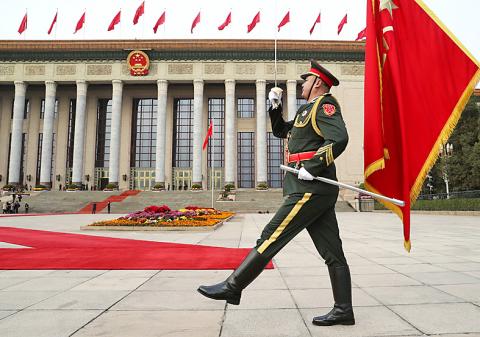The Pentagon on Tuesday released a report that lays out US concerns about China’s growing military might, underscoring worries about a possible attack on Taiwan.
The key concern is that as China upgrades its military equipment and technology, and reforms how it trains and develops troops, it becomes more confident in its ability to wage a regional conflict, a senior US defense intelligence official told reporters.
Beijing has made it clear that asserting sovereignty over Taiwan is its top priority, they said.

Photo: AP
Although China could easily fire missiles at Taiwan, it does not yet have the military capability to successfully invade, the official added.
They spoke on condition of anonymity to provide more detail on intelligence findings in the report, which was written by the US Defense Intelligence Agency.
Its release came a week after Chinese President Xi Jinping (習近平) called on the Chinese People’s Liberation Army (PLA) to better prepare for combat.
The report talks broadly about the steps China is taking to modernize its military and expand its operations around the globe.
The worry is that China would reach the point where leaders would decide that using military force for a regional conflict is more imminent, the official said.
“Beijing’s long-standing interest to eventually compel Taiwan’s reunification with the mainland and deter any attempt by Taiwan to declare independence has served as the primary driver for China’s military modernization,” the report says. “Beijing’s anticipation that foreign forces would intervene in a Taiwan scenario led the PLA to develop a range of systems to deter and deny foreign regional force projection.”
The PLA is “likely to grow even more technologically advanced, with equipment comparable to that of other modern militaries,” it said.
The US official said that China has been working hard on developing ways to combine cyberattacking capabilities with kinetic weapons.
However, Beijing would face a significant challenge as it tries to bring generational change to its military, they added.
China has mainly done tightly controlled regional operations and some counterpiracy missions, but it would be more difficult to create a joint force capable of conducting large, complex combat operations far abroad, the official said.
Ministry of National Defense Major General Chen Chung-chi (陳中吉) said that Taiwan watches the development of Chinese military capabilities more closely than any other nation.
“However warfare could play out, that is how we train,” Chen said on the sidelines of a simulated drill at the Hsinchu Air Base to reinforce the military’s defense capabilities ahead of the Lunar New Year holiday.
Additional reporting by Aaron Tu

AGING: As of last month, people aged 65 or older accounted for 20.06 percent of the total population and the number of couples who got married fell by 18,685 from 2024 Taiwan has surpassed South Korea as the country least willing to have children, with an annual crude birthrate of 4.62 per 1,000 people, Ministry of the Interior data showed yesterday. The nation was previously ranked the second-lowest country in terms of total fertility rate, or the average number of children a woman has in her lifetime. However, South Korea’s fertility rate began to recover from 2023, with total fertility rate rising from 0.72 and estimated to reach 0.82 to 0.85 by last year, and the crude birthrate projected at 6.7 per 1,000 people. Japan’s crude birthrate was projected to fall below six,

Conflict with Taiwan could leave China with “massive economic disruption, catastrophic military losses, significant social unrest, and devastating sanctions,” a US think tank said in a report released on Monday. The German Marshall Fund released a report titled If China Attacks Taiwan: The Consequences for China of “Minor Conflict” and “Major War” Scenarios. The report details the “massive” economic, military, social and international costs to China in the event of a minor conflict or major war with Taiwan, estimating that the Chinese People’s Liberation Army (PLA) could sustain losses of more than half of its active-duty ground forces, including 100,000 troops. Understanding Chinese

SELF-DEFENSE: Tokyo has accelerated its spending goal and its defense minister said the nation needs to discuss whether it should develop nuclear-powered submarines China is ramping up objections to what it sees as Japan’s desire to acquire nuclear weapons, despite Tokyo’s longstanding renunciation of such arms, deepening another fissure in the two neighbors’ increasingly tense ties. In what appears to be a concerted effort, China’s foreign and defense ministries issued statements on Thursday condemning alleged remilitarism efforts by Tokyo. The remarks came as two of the country’s top think tanks jointly issued a 29-page report framing actions by “right-wing forces” in Japan as posing a “serious threat” to world peace. While that report did not define “right-wing forces,” the Chinese Ministry of Foreign Affairs was

US President Donald Trump in an interview with the New York Times published on Thursday said that “it’s up to” Chinese President Xi Jinping (習近平) what China does on Taiwan, but that he would be “very unhappy” with a change in the “status quo.” “He [Xi] considers it to be a part of China, and that’s up to him what he’s going to be doing, but I’ve expressed to him that I would be very unhappy if he did that, and I don’t think he’ll do that. I hope he doesn’t do that,” Trump said. Trump made the comments in the context